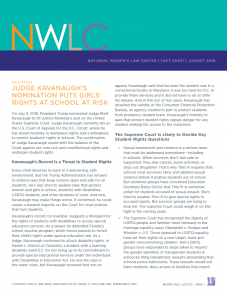Abortion rights, women of color, and LGBTQIA+ people are under attack. Pledge to join us in fighting for gender justice.
 On July 9, 2018, President Trump nominated Judge Brett Kavanaugh to fill Justice Kennedy’s seat on the United States Supreme Court. Judge Kavanaugh currently sits on the U.S. Court of Appeals for the D.C. Circuit, where he has shown hostility to workplace rights and a willingness to restrict students’ rights in schools. The confirmation of Judge Kavanaugh would shift the balance of the Court against our core civil and constitutional rights and endanger student rights.
On July 9, 2018, President Trump nominated Judge Brett Kavanaugh to fill Justice Kennedy’s seat on the United States Supreme Court. Judge Kavanaugh currently sits on the U.S. Court of Appeals for the D.C. Circuit, where he has shown hostility to workplace rights and a willingness to restrict students’ rights in schools. The confirmation of Judge Kavanaugh would shift the balance of the Court against our core civil and constitutional rights and endanger student rights.
Kavanaugh’s Record Is a Threat to Student Rights
Every child deserves to learn in a welcoming, safe environment. But the Trump Administration has refused to enforce laws that keep schools open and safe for all students. He’s also tried to weaken laws that protect women and girls in school, students with disabilities, LGBTQ students, and other students of color. And now, Kavanaugh may make things worse. If confirmed, he could create a staunch majority on the Court for cruel policies that hurt students.
Kavanaugh’s record, for example, suggests a disregard for the rights of students with disabilities to access special education services. As a lawyer, he defended Florida’s school voucher program, which forces parents to forfeit their child’s rights under special education law. As a judge, Kavanaugh continued to attack disability rights. In Hester v. District of Columbia, a student with a learning disability sued D.C. for not living up to its commitment to provide special educational services under the Individuals with Disabilities in Education Act. He won his case in the lower court, but Kavanaugh reversed that win on appeal. Kavanaugh said that because the student was in a correctional facility in Maryland, it was too hard for D.C. to provide these services and it did not have to do so after his release. And in five out of five cases, Kavanaugh has attacked the validity of the Consumer Financial Protection Bureau, an agency created in part to protect students from predatory student loans. Kavanaugh’s hostility to laws that protect student rights signals danger for any student seeking fair access to the classroom.
The Supreme Court Is Likely to Decide Key Student Rights Questions
- Sexual harassment and violence is a serious issue that must be addressed everywhere—including in schools. When survivors don’t feel safe or supported, they skip classes, avoid activities, or drop out altogether. That’s why Title IX requires that schools treat survivors fairly and address sexual violence before it pushes students out of school. But extremist groups have convinced Education Secretary Betsy DeVos that Title IX is somehow unfair for students accused of sexual assault. She’s tried to weaken Title IX to give special rights to accused rapists. But survivor groups are suing to stop her. The Supreme Court could weigh in on this fight in the coming years.
- The Supreme Court has recognized the dignity of LGBTQ people and families–most famously in the marriage equality cases Obergefell v. Hodges and Windsor v. U.S. Those opposed to LGBTQ equality have set their sights on a new target: trans and gender nonconforming children. Anti-LGBTQ groups have responded to steps taken to respect the gender identities of transgender students in school by filing transphobic lawsuits demanding that schools police bathrooms. These lawsuits would out trans students, deny access to facilities that match their gender identity, and okay policing based on gender stereotypes. So far, all three federal courts of appeals to hear these cases have affirmed trans students’ right to use facilities that match their gender identity. DeVos’ first act as Secretary of Education was getting rid of guidance that said how schools can do right by trans students. And under her leadership, the Department is refusing to investigate Title IX claims based on a school’s denial of bathroom access to trans students—even in states where the court said doing so breaks the law. Her reasoning? The Supreme Court hasn’t weighed in yet. The same groups that oppose transgender students support Kavanaugh’s nomination. The Supreme Court will likely soon either affirm or deny whether all children have the right to be treated with respect in schools.
A Justice Who Undermines Student Rights Will Harm Students and Make Schools Unsafe
If Justice Kennedy is replaced by a judge who ignores student rights, the Supreme Court is likely to have five votes to weaken many key educational protections. The likely result? A world where students with disabilities barely get an education. Where survivors of sexual violence are pushed out of school while harassment goes unchecked. Where trans and gender nonconforming students are policed in their most private moments. The next Supreme Court justice will decide cases critical to the future of children and students. Kavanaugh’s record on student rights is a flashing warning light. We cannot allow the balance of the Court to shift against protections that make schools safer, fairer, and more open to all.
